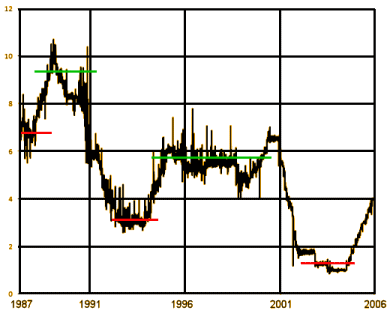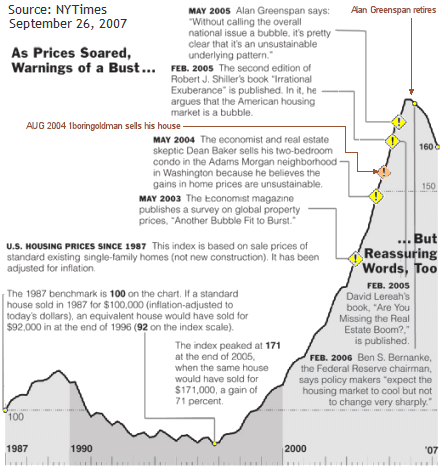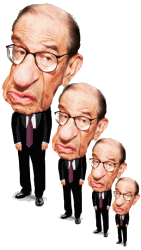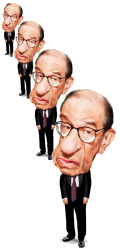Friend ShrinkRap has an interesting metaphor for the once bigger than life Alan Greenspan – the incredible shrinking man. Nothing could be more appropriate. He seemed bigger than life to us – a Guru of Capitalism. He kept our economy humming along like a finely tuned NASCAR motor built to go the whole 500 miles. But there were some things we failed to notice:


• We didn’t notice that in controlling the economy by adjusting the Interest Rate at the Fed, Greenspan could improve things by lowering the rates, but he never fully recovered after lowering them – meaning that his leeway slowly eroded – leaving Bernake no place to go after Greenspan retired [greenspan’s folly…].
But going back in time, during the Administration of George H.W. Bush, Wendy Gramm, a Ph.D. Economist and wife of Senator Phil Gramm was Chairman of the Commodity Futures Trading Commission. The not-yet-notorious Enron Corporation was lobbying to be exempted from regulation in its trading of Energy Derivatives. In 1993 as her last actbefore leaving, she granted the exception. She left the CFTC, and [went on the Board of Enron]. She was followed at the CFTC in 1994 by Mary Schapiro who moved on to become President of NASD. So Brooksley Born became Chairman of the Commodity Futures Trading Commission a couple of years after Wendy Gramm’s exception. By 1998, that exception had grown into a gajillion dollar, unregulated Derivatives Market. In May of 1998, Born published a "concept release" asking for input about whether and how to regulate this expanding Derivatives Market [the "dark" Market]. This idea was immediately opposed by Federal Reserve Chairman Alan Greenspan, Treasury Secretary Robert E. Rubin and Securities and Exchange Commission Chairman Arthur Levitt Jr. Then when Long Term Capital Management, a Hedge Fund heavily into Derivative Trading collapsed, she escalated her concerns about this unregulated Market in Derivatives. Her opponents responded by getting Congress to declare a 6 month moratorium on regulating Derivatives. After multiple meetings and some seventeen Congressional appearances, she gave up and left her post in June 1999. In November, the President’s Working Group on the Economy [Treasury Secretary Lawrence H. Summers, Federal Reserve Chairman Alan Greenspan, Securities and Exchange Commission Chairman Arthur Levitt Jr., and the new Chairman of the Commodity Futures Trading Commission Arthur Levitt William J. Rainer] issued a report, Over-the-Counter Derivatives Markets and the Commodity Exchange Act, unanimously recommending that these Derivative Markets continue unregulated.
Greenspan: Housing Market Bubble Bursting ‘Most Unlikely’
Reality Times
by Broderick Perkins
October 21, 2004However, the vast majority of homeowners needn’t fear big price drops because such an event will likely occur only locally. Economic diversity holds sway over statistical models that predict a nationwide home price drop. That’s according to Federal Reserve Chairman Alan Greenspan who in a recent speech repeated a refrain that punches holes in theories that the housing market is an overinflated bubble about to burst.
"These concerns cannot be readily dismissed. Debt leverage of all types is often troublesome when one judges the stability of the economy. Should home prices fall, we would have reason to be concerned about mortgage debt; but measures of household financial stress do not, at least to date, appear overly worrisome," he said in a speech before the America’s Community Bankers Annual Convention this week…
"It would take a large, and historically most unusual, fall in home prices to wipe out a significant part of home equity," he told conventioneers. Greenspan said housing price bubble theories also assume there is too much speculation in the market and that home buyers are looking at homes as get-rich-quick investments, but in reality expensive buying and selling fees and the need to have a roof over one’s head prevent such conditions. He said investors accounted for only 11 percent of the total home mortgage originations in 2003 and represent a small fraction of the overall housing market.
"Overall, while local economies may experience significant speculative price imbalances, a national severe price distortion seems most unlikely in the United States, given its size and diversity," Greenspan said…

As top Federal Reserve officials debated whether there was a housing bubble and what to do about it, then-Chairman Alan Greenspan argued that the dissent should be kept secret so that the Fed wouldn’t lose control of the debate to people less well-informed than themselves. "We run the risk, by laying out the pros and cons of a particular argument, of inducing people to join in on the debate, and in this regard it is possible to lose control of a process that only we fully understand," Greenspan said, according to the transcripts of a March 2004 meeting.
At the same meeting, a Federal Reserve bank president from Atlanta, Jack Guynn, warned that "a number of folks are expressing growing concern about potential overbuilding and worrisome speculation in the real estate markets, especially in Florida. Entire condo projects and upscale residential lots are being pre-sold before any construction, with buyers freely admitting that they have no intention of occupying the units or building on the land but rather are counting on ‘flipping’ the properties–selling them quickly at higher prices." Had Guynn’s warning been heeded and the housing market cooled, the financial collapse of 2008 could have been avoided. But his comment was kept secret until Friday, when the central bank released the transcripts of Federal Open Market Committee meetings for 2004 and CalculatedRisk spotted it. The transcripts for 2005 to the present are still secret.
"The substantial run-up in house prices, which we have followed in Florida and also see in the populous Northeast and West Coast of the United States, may be at least partially attributable to unusually low mortgage rates influenced by our very accommodative policy," Guynn warned. But when the Fed released contemporaneous minutes of the meeting, the bank downplayed Guynn’s concerns.
"Reports from some contacts suggested that speculative forces might be boosting housing demand in some parts of the country, with concomitant effects on prices, suggesting the possibility that house prices might be moving into the high end of the range that could be consistent with fundamentals," reads the minutes, which were released to the public several weeks after the meeting…


Mickey — I love what you’ve done with the off-the-cuff moniker I stuck on The Oracle.
ShrinkRap